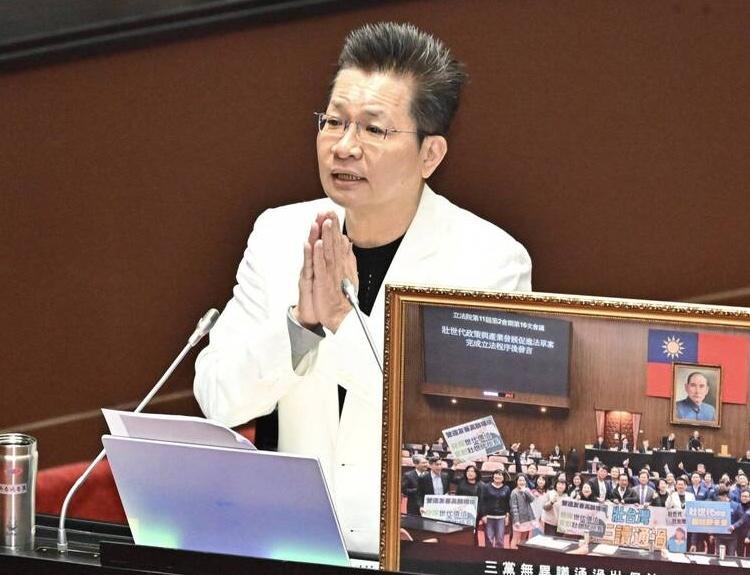A proposal to abolish the recently promulgated Act Promoting Development for Strong Generation Policies and Industries (壯世代政策與產業發展促進法) was approved for committee review by the Legislative Yuan this morning.
The act was heavily promoted by former Taiwan People’s Party legislator Wu Chun-cheng (吳春城), who resigned from his post at the end of last month over conflicts of interest related to the bill.
Democratic Progressive Party Legislator Chen Pei-yu (陳培瑜) is leading the proposal to abolish the act.

Photo: Tu Chien-jung, Taipei Times
The proposal claims that the term “strong generation” does not align with internationally or domestically established generational categories and could result in overlapping government policies.
The act defines the “strong generation” as those aged 55 or older with the ability and willingness to work, and stipulates that the government is responsible for putting in place policies to help that generation lead a better life.
There is little research or precedent internationally or domestically that supports a generational divide at the age of 55, the proposal said.
Policies by the UN and International Labour Organization (ILO) define those aged 45 to 65 as middle-aged and those 65 and over as elderly, it said.
International organizations and major countries have never used the term “strong generation” or defined those aged 55 and older as a distinct generation, the proposal said.
In addition, Taiwan has previously implemented legislation that promotes the employment and quality of life of the middle-aged and elderly generations, it said.
For example, the Middle-aged and Elderly Employment Promotion Act (中高齡者及高齡者就業促進法) was promulgated in 2019.
The Executive Yuan also revised Taiwan’s white paper on its aging society in 2021, and proposed a plan to respond to the challenges of a super-aging society based on it, the proposal said.
The definitions of the middle-aged and elderly generations in these policies align with those of the UN and ILO, the proposal said, emphasizing that these definitions differ from the “strong generation.”
The term “strong generation” does not connect with international standards and would therefore be challenging for the Executive Yuan to implement, the proposal said, adding that Taiwanese society does not have a common understanding of the term, making it easy to confuse with existing concepts.
The act should be abolished to prevent redundant administrative work, uphold the multicultural diversity of public terminology and eliminate concerns over potential misuse of the term by individuals with ulterior motives, it said.

Nipah virus infection is to be officially listed as a category 5 notifiable infectious disease in Taiwan in March, while clinical treatment guidelines are being formulated, the Centers for Disease Control (CDC) said yesterday. With Nipah infections being reported in other countries and considering its relatively high fatality rate, the centers on Jan. 16 announced that it would be listed as a notifiable infectious disease to bolster the nation’s systematic early warning system and increase public awareness, the CDC said. Bangladesh reported four fatal cases last year in separate districts, with three linked to raw date palm sap consumption, CDC Epidemic Intelligence

Two Taiwanese prosecutors were questioned by Chinese security personnel at their hotel during a trip to China’s Henan Province this month, the Mainland Affairs Council (MAC) said yesterday. The officers had personal information on the prosecutors, including “when they were assigned to their posts, their work locations and job titles,” MAC Deputy Minister and spokesman Liang Wen-chieh (梁文傑) said. On top of asking about their agencies and positions, the officers also questioned the prosecutors about the Cross-Strait Joint Crime-Fighting and Judicial Mutual Assistance Agreement, a pact that serves as the framework for Taiwan-China cooperation on combating crime and providing judicial assistance, Liang

Reports of Taiwanese going missing, being detained or interrogated, or having their personal liberties restricted in China increased about fourfold annually last year, the Mainland Affairs Council (MAC) said yesterday. Last year, 221 Taiwanese who traveled to China were reported missing, were detained and interrogated, or otherwise had their personal freedom restricted, up from 55 the previous year, the council said. Reopening group tours to China would be risky, as it would leave travelers with no way to seek help through official channels after Beijing shut down dialogue between the associations tasked with handling cross-strait tourism, the MAC said. Taipei’s Taiwan Strait Tourism

SHIFT: Taiwan is evolving from a transit stop into a tourist destination, with more international travelers willing to spend on tours, dining and cultural activities Taiwan rose three places in the World Tourism Barometer to 36th globally in 2024, with international tourism revenue of US$10.028 billion, the Tourism Administration said on Monday. The UN Tourism Organization publication said that its focus has switched from whether a country has returned to pre-COVID-19 levels of tourism to the amount spent by a tourist during an overseas trip. The nation last year welcomed 8.57 million international tourists, about 9 percent more than in 2024, with most tourists coming from Japan, South Korea, and Hong Kong and Macau, all of which accounted for at least 1 million tourists each. During the first